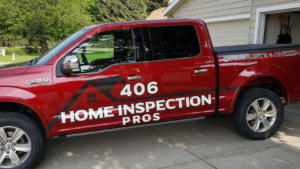If you’re considering buying a Montana home, there’s one thing you should know. The “perfect” home doesn’t have to be truly perfect. Most homes have minor defects and small problems that are easy to fix. The important thing is to go into the purchasing process with your eyes wide open. After all, nobody wants to be surprised by a big home repair bill they weren’t expecting.
Luckily, that’s where 406 Home Inspection Pros comes in.

Our team of trusted home inspection experts will inspect your home like we’re buying it. When you work with us, we provide the information and insight you need to make an informed purchasing decision.
In this blog, we’ll discuss a few of the things we look for during a home inspection. We’ll also talk about why a pre-purchase home inspection is so important to protect your investment.
Let’s dive in.
What is a Home Inspection?
A home inspection is a step that usually takes place before the sale of a home. It includes a visual assessment of a home’s structure and systems, including the HVAC system, roof, ceiling, walls, and foundation. The home inspector will also evaluate the indoor lighting, electrical panel, water heater, and more.
During a home inspection, the home inspector will check the following things:
Finally, a home inspector will identify seemingly small issues, like a jetted tub that isn’t working or a lightbulb that’s burnt out in the hallway. The home inspector may also conduct a radon test if requested.
The idea is to present you with as much information as possible to help you make an informed house-buying decision.
How Home Inspectors Evaluate a Property
Home inspectors know how to separate the urgent from the important. They may make recommendations about things you should have fixed pre-purchase, and things you can wait to address in the future. Home inspectors also look at a home with a critical eye, but not a judgmental one. They aren’t there to tell you whether to purchase the home.
Instead, they use their skills to identify small or significant flaws in the home so that you know exactly what you’re getting into. For example, a home inspector might realize that the house you want to purchase needs a new roof or water heater, or that the foundation is cracked, and the home is unsafe and unstable.
When you have this kind of information before you buy the home, you can negotiate the terms of the purchase agreement, arrange for the seller to handle major repairs, or avoid purchasing the home altogether.
Your Montana Home Through the Eyes of a Home Inspector
So, how do home inspectors differ from real estate agents, builders, appraisers, or other people involved in the real estate sale process? The answer is simple:
A good home inspector looks at a house from a different perspective than an average homebuyer or contractor. Home inspectors know how to look past the small things and identify underlying issues that could be problematic, dangerous, or expensive down the road.
Structural Problems
The first thing a home inspector looks for are structural problems. While structural problems are rare, they can cause massive issues when they do appear, so home inspectors rule them out immediately.
Water Issues
In the experience of the team here at 406 Home Inspection Pros, problems usually start with water in one form or another. In Montana, this issue is particularly pronounced, thanks to our rainy springs and cold, snowy winters.
Roof Leaks, gutter problems, drainage problems, ground water, high water tables, poor lot drainage, and similar issues can all cause massive problems for a property.
Over time, water can lead to structural damage, mold, rot, foul odors, flooding, safety issues, and many other problems. Water can also destroy rugs, carpets, furniture, building materials, personal possessions, and more.
While a wet crawl space may seem urgent, it’s important to identify why it’s wet in the first place. Removing the water without correcting the problem will only cause more damage down the road. This willingness to uncover underlying problems is what makes home inspections particularly valuable.
Even if your home inspector can’t tell you why something is happening, they can identify the problem and suggest a specialist in that field.
And More
Home inspectors have found some seriously wacky things during inspections, from beer boxes stuffed into electrical panels to crushed, rotten joists tasked with holding up the entire home. Fortunately, you can trust that your home inspector will evaluate every aspect of your home and report on any issues they find.
When to Get a Home Inspection
If you’re building or buying a home, you need a home inspection. While today’s competitive real estate market has seen some people waiving their right to a home inspection, we never recommend doing this.
Without a home inspection, it’s impossible to know if the home has dangerous issues, and how pressing those issues are. If you decide to proceed with a purchase like this, you may wind up buying a home that has dangerous issues that put you and your family at risk. Alternately, you may find out that the home needs repairs that you can’t afford to conduct, like a new roof or foundation, or a new HVAC system.
No matter how enticing it may be to speed up a sale by waiving the home inspection, we recommend insisting on an inspection at all costs. Inspections are quick and informative and could easily save you from buying the wrong home for your family or budget.
406 Home Inspection Pros: Proudly Serving Montana Homeowners
Here at 406 Home Inspection Pros, we pride ourselves on being the home inspector of choice for Montana home buyers and sellers.
Whether you want to check your new property for mold, or you need a radon test before purchasing a home, you can count on our team to deliver. Contact us today to learn more about our inspection services or to schedule your inspection now.


 Definition:
Definition:



